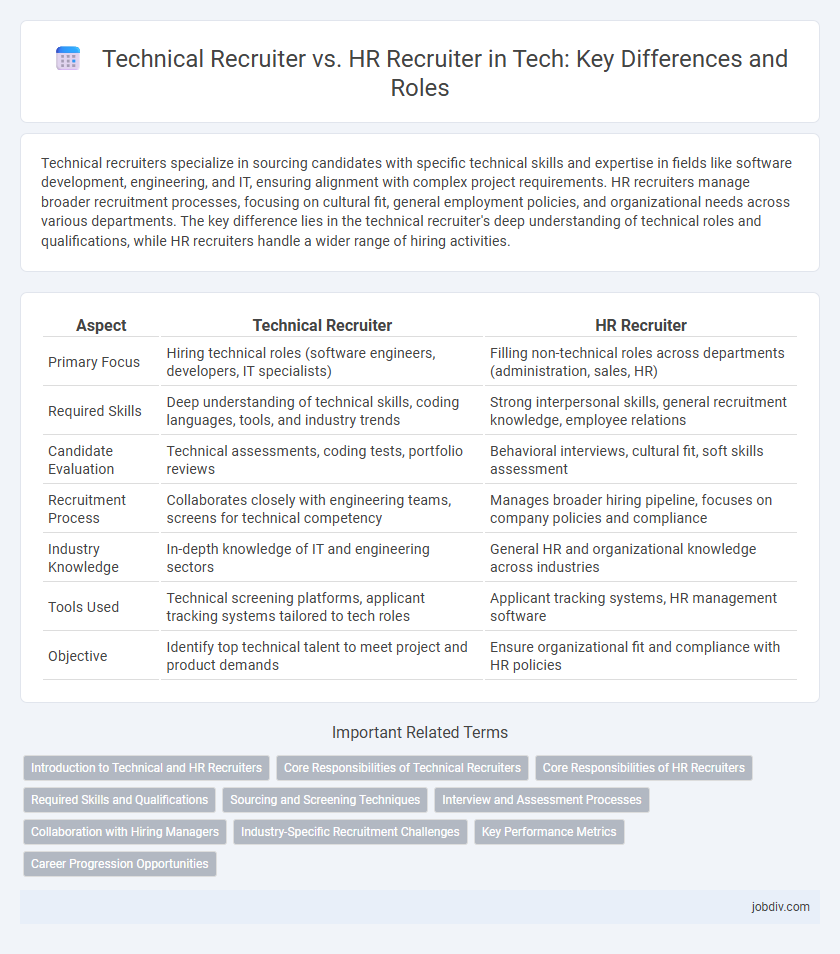Technical recruiters specialize in sourcing candidates with specific technical skills and expertise in fields like software development, engineering, and IT, ensuring alignment with complex project requirements. HR recruiters manage broader recruitment processes, focusing on cultural fit, general employment policies, and organizational needs across various departments. The key difference lies in the technical recruiter's deep understanding of technical roles and qualifications, while HR recruiters handle a wider range of hiring activities.
Table of Comparison
| Aspect | Technical Recruiter | HR Recruiter |
|---|---|---|
| Primary Focus | Hiring technical roles (software engineers, developers, IT specialists) | Filling non-technical roles across departments (administration, sales, HR) |
| Required Skills | Deep understanding of technical skills, coding languages, tools, and industry trends | Strong interpersonal skills, general recruitment knowledge, employee relations |
| Candidate Evaluation | Technical assessments, coding tests, portfolio reviews | Behavioral interviews, cultural fit, soft skills assessment |
| Recruitment Process | Collaborates closely with engineering teams, screens for technical competency | Manages broader hiring pipeline, focuses on company policies and compliance |
| Industry Knowledge | In-depth knowledge of IT and engineering sectors | General HR and organizational knowledge across industries |
| Tools Used | Technical screening platforms, applicant tracking systems tailored to tech roles | Applicant tracking systems, HR management software |
| Objective | Identify top technical talent to meet project and product demands | Ensure organizational fit and compliance with HR policies |
Introduction to Technical and HR Recruiters
Technical recruiters specialize in sourcing and evaluating candidates with specific technical skills such as software development, engineering, or IT infrastructure. HR recruiters focus on broader talent acquisition, managing recruitment processes for diverse roles that may include administrative, managerial, and operational positions. Both play crucial roles in workforce development, but technical recruiters require deep industry knowledge to assess technical expertise accurately.
Core Responsibilities of Technical Recruiters
Technical recruiters specialize in sourcing, screening, and hiring candidates with specific IT and engineering skills, ensuring alignment with technical project requirements. They conduct in-depth technical interviews, evaluate coding abilities, and collaborate closely with hiring managers to understand detailed skillsets and technologies needed. Expertise in industry-specific tools like Applicant Tracking Systems (ATS) tailored for IT roles and knowledge of current tech trends are essential for effective candidate evaluation and placement.
Core Responsibilities of HR Recruiters
HR recruiters primarily focus on sourcing, screening, and interviewing candidates to fill various non-technical roles across departments such as administration, finance, and marketing. They manage the end-to-end recruitment process, including coordinating interviews, conducting background checks, and ensuring compliance with labor laws and company policies. HR recruiters also collaborate with hiring managers to understand role requirements and maintain a talent pipeline for organizational growth.
Required Skills and Qualifications
Technical recruiters require proficiency in IT terminology, software development lifecycle, and coding languages to accurately assess candidate expertise, alongside strong networking and sourcing skills specific to tech talent. HR recruiters prioritize expertise in employment law, employee relations, and general recruitment processes, emphasizing interpersonal communication and conflict resolution abilities. Both roles demand proficiency in applicant tracking systems (ATS) and candidate evaluation techniques, but technical recruiters need in-depth industry-specific knowledge to screen specialized candidates effectively.
Sourcing and Screening Techniques
Technical Recruiters leverage specialized sourcing tools such as GitHub, Stack Overflow, and coding challenge platforms to identify candidates with niche programming skills, using technical assessments and coding interviews for screening. HR Recruiters primarily utilize job boards, social media, and applicant tracking systems (ATS) to source candidates across various functions, focusing on behavioral interviews and resume reviews for screening. The distinct approach of Technical Recruiters emphasizes evaluating technical proficiency and problem-solving abilities, whereas HR Recruiters assess cultural fit and general qualifications.
Interview and Assessment Processes
Technical recruiters specialize in evaluating candidates' programming skills, coding abilities, and technical knowledge through practical assessments and technical interviews tailored to specific roles. HR recruiters focus on assessing cultural fit, communication skills, and behavioral attributes using situational interviews and personality tests. Both recruiters collaborate to ensure a comprehensive candidate evaluation, combining technical proficiency with alignment to company values.
Collaboration with Hiring Managers
Technical recruiters collaborate closely with hiring managers to define precise job requirements, ensuring alignment on specialized skills and technical qualifications essential for roles in engineering, IT, and software development. HR recruiters focus on broader talent acquisition strategies, partnering with hiring managers to assess cultural fit, compensation expectations, and organizational needs across various departments. Effective collaboration between recruiters and hiring managers accelerates the hiring process and improves candidate quality by combining technical expertise with strategic human resources insights.
Industry-Specific Recruitment Challenges
Technical recruiters specialize in sourcing candidates with niche skills in IT, engineering, and software development, requiring deep industry knowledge to evaluate technical competencies accurately. HR recruiters manage broader talent acquisition across various departments, facing challenges in understanding specialized roles and technical jargon. Industry-specific recruitment hurdles include rapidly evolving skill requirements, high competition for top technical talent, and the necessity for tailored candidate assessment techniques.
Key Performance Metrics
Technical Recruiters are primarily evaluated on metrics such as time-to-fill for highly specialized roles, quality of hire based on technical assessments, and candidate retention rate within engineering teams. HR Recruiters are measured by overall hiring volume, applicant flow efficiency, and diversity hiring targets across various departments. Both roles benefit from candidate satisfaction scores and offer acceptance rates, but Technical Recruiters emphasize technical skill match and project impact more heavily.
Career Progression Opportunities
Technical recruiters often advance by specializing in high-demand industries like software development or IT infrastructure, moving into roles such as talent acquisition manager or technical recruiting lead. HR recruiters generally progress towards broader human resources management positions, including HR business partner or head of recruitment, overseeing company-wide hiring strategies. Career growth for technical recruiters is closely tied to industry expertise and technology trends, while HR recruiters benefit from developing comprehensive employee lifecycle knowledge.
Technical Recruiter vs HR Recruiter Infographic

 jobdiv.com
jobdiv.com